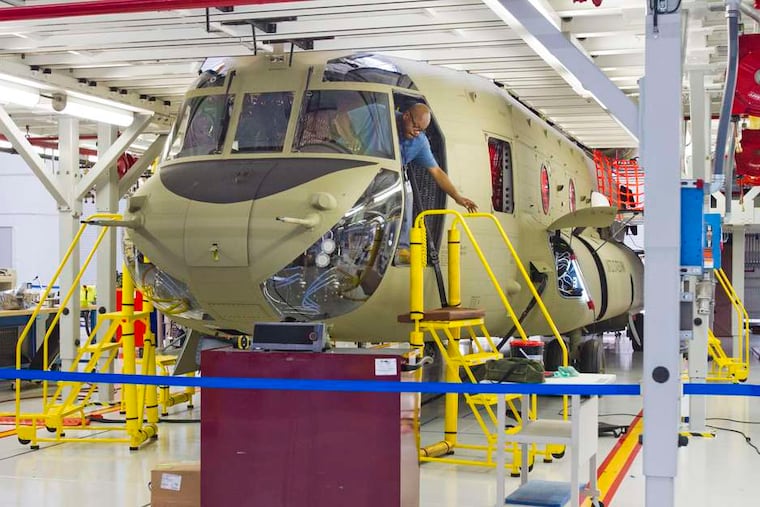Can Pa. Democrats pressure Pentagon, Congress as GOP did, to save Boeing jobs?
The region’s largest remaining factory complex, the Boeing helicopter works in Ridley, employs nearly 4,500 workers.

Suburban Philadelphia voters shifted three congressional seats from Republican to Democratic in November’s election, but one thing hasn’t changed: the bipartisan fight to keep U.S. military contracts flowing to the region’s largest remaining factory complex, the Boeing helicopter works in Ridley Park.
That’s why, on windswept tarmac between the plant and the gray, mile-wide Delaware River, aides to Sens. Pat Toomey (R., Pa.) and Chris Coons (D., Del.) joined host U.S. Rep. Mary Gay Scanlon (D., Pa.) and hundreds of Boeing workers Thursday morning, to greet the first of a series of Chinook 47 helicopters the plant is upgrading for Army Special Forces units as it returned from a test flight.
Scanlon said she was there last month, too, with U.S. Reps. Brian Fitzpatrick (R., Pa.) and Chrissy Houlahan (D., Pa.), to help strategize how to save a large upgrade project that was supposed to keep the plant that employs about 4,500 workers busy for the next 20 years but is now in doubt.
Scanlon made Boeing’s case to members of a key House Appropriations subcommittee earlier this month, and said Rep. Donald Norcross (D., N.J.) who heads an Armed Services subcommittee, plans to stop by Ridley soon, after touring other key defense facilities affected by changing Pentagon plans.
The Army in 2017 ordered hundreds of Chinooks upgraded with new rotor blades, drive trains, fuel systems and electronics at Ridley Park, making them more powerful so they can handle 12-ton loads for the next 50 years.
At the time, Boeing said that upgrade program, plus a separate assembly line for Osprey tilt-rotor planes and orders from allied governments from Saudi Arabia to Singapore, would assure the plant’s future at least until most of the plant’s current workforce is retirement age.
But in March, Army officials said they were canceling the main upgrade program because they weren’t sure that they would need all that lift, after all -- and the money could be better spent on new assault helicopters, robotic vehicles, digitally connected weapons, space communications, and short-range missile defense, among other priorities, to cope with improved Chinese missiles and Russian missile-defense and cyber-attack initiatives.
Boeing’s Osprey, Special Operations, and foreign orders continue, but the apparent end of the general Chinook upgrades threatens significant layoffs at Ridley Park, if it isn’t reversed over the next couple of years.
“It’s up in the air,” said Mike Tolassi, president of UAW Local 1069, which represents 1,300 of the workers at the plant. He’s glad to see new faces among the elected leaders pledge to lobby for more work: “Everybody’s helping the hunt. They jump right in.”
Boeing vice president David Koopersmith recounted Army Vice Chief of Staff James McConville’s remarks from the yearly Army Aviation Association of America meeting in Nashville on April 17: After calling Chinook “an incredible aircraft," McConville said the Army was “moving forward” with the Special Forces upgrades -- and “determining the way forward” for the larger Army upgrade program, making it sound as if the decision weren’t final.
But Army Secretary Mark Esper hasn’t reversed the March decision to stall the helicopter program.
It’s not just Boeing that hangs on the Army’s decision. Such contractors as Summit Aviation in Middletown, Del., and Ehmke Manufacturing Co., which employs 130 at its fiberglass foam thermal acoustic blanket plant in Juniata Park, also staff up for Chinook contracts.
Ehmke relies on Boeing for about a quarter of its business, said CEO and part-owner Bob Rosania. “That’s why we diversify,” he added, by also supplying civilian companies such as Carson Helicopters in Perkasie.
It takes three years to plan and build or substantially rebuild aircraft, “from contract to delivery,” said Randy Rotte, Boeing director of sales and marketing. The Ridley Park plant will remain busy for at least the next couple of years, but if there’s no reversal on the Chinook upgrades by this time next year, “it could absolutely start to have effects,” including layoffs.
Boeing, meanwhile, is moving its Osprey works from across Pennsylvania 291 to a former Baldwin Locomotive building next to the Chinook works, making room for another potential production line -- but such projects take years to develop, even when there’s certainty in the government’s plans, and a new production program in sight.